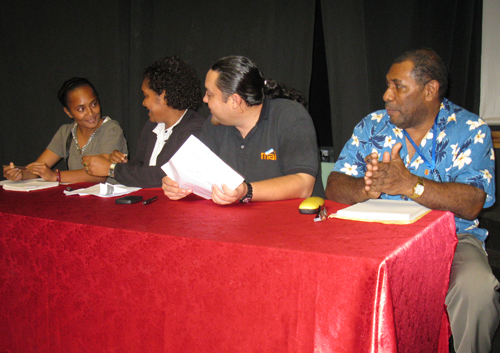
Nanise Nawalowalo and Maria Laqeta
SUVA: The media can be a bridge-builder by promoting and mobilising public support for peace-building processes, says the United Nations resident coordinator in Fiji Knut Ostby.
Media can also promote positive relationships between groups, particularly in conflicts over ethnic and religious identity, said Ostby.
He made the comments while opening a one-day symposium on the "Role of media and civil society in strengthening democracy and social cohesion" at the University of the South Pacific's Laucala Campus in Suva, Fiji, on Friday.
Ostby said that in today’s interactive society, it impossible for the media to stand on the sidelines as an entirely neutral observer.
“Inevitably it must play a role, and it must make a choice about which role to play,” he said.
Convened by the head of journalism at USP, Shailendra Singh, and senior lecturer in management, Dr Desmond Amosa, the symposium was co-sponsored by the USP's faculties of Arts and Law (FAL) and Business and Economics (FBE). It was supported by the United Nations Development Program (UNDP) in Suva.
Ostby said peace and development were closely interconnected, adding that the media was an important tool for instigating change in societies struggling for peace and strengthening of democratic principles.
Critical role
“The power of the media is recognised by all, and I am sure everyone here this morning also recognises the critical role the media plays or could play in support of democracy and conflict transformation through peace-building.”
Ostby pointed out that media played the dual role of “both speaking to the public and speaking on behalf of the public”.
In providing a platform for public debate, the media enabled a diversity of views to be heard on issues of common concern, added Ostby.
Commenting on the rapid increase in the speed and diversity of how information is disseminated, Ostby said the role of a journalist had become more dynamic and participatory.
By broadening its role, the media had defined a role for itself as a more active player in shaping societies, said Ostby.
“The media also empowers citizens by keeping them informed and helps them to monitor the performance of government policies, therefore contributes to public accountability,” he said.
Imposed censorship
Ostby pointed out that it had not always been smooth sailing for the media, especially in countries where the political environment restricts freedom of expression and imposes censorship of the media.
“ I am aware that the media throughout the Pacific have experienced challenging times when its relationship with the government deteriorates,” he said.
“Our eminent speakers here today, I’m sure, will share their experiences with you in this regard – and more importantly, we will hear how such challenges were addressed, and what opportunities exist for media to play a role for peace building and development.”
Keynote speakers included associate professor and director of the Pacific Media Centre at the Auckland University of Technology, New Zealand, Dr David Robie; publisher and chief executive of Tonga's Taimi Media Network, Kalafi Moala; and senior lecturer in journalism and communications at the University of Queensland, Dr Levi Obijiofor. - University of the South Pacific/Pacific Media Watch



